Management Perspectives: An Analysis of CPB Contractors' Practices
VerifiedAdded on 2021/02/20
|11
|2951
|30
Report
AI Summary
This report provides a comprehensive analysis of CPB Contractors, a prominent construction company in Australia, examining its management perspectives, organizational theory, and leadership approaches. The report delves into the company's adoption of neo-classical theory, its emphasis on human relations, and the influence of leadership styles, including transactional approaches, on project outcomes. It explores the company's ethical practices, guided by the CIMIC Group Code of Conduct, emphasizing integrity, innovation, and safety. The analysis considers the importance of ethical decision-making and organizational legitimacy, highlighting how CPB Contractors maintains its market position through ethical conduct and adherence to legal obligations. The report also suggests the adoption of modern organizational theory to enhance the company's organizational culture and address potential shortcomings of the neo-classical approach. Overall, the report underscores the critical role of management, leadership, and ethical practices in achieving business objectives and ensuring sustainable success within the construction industry.
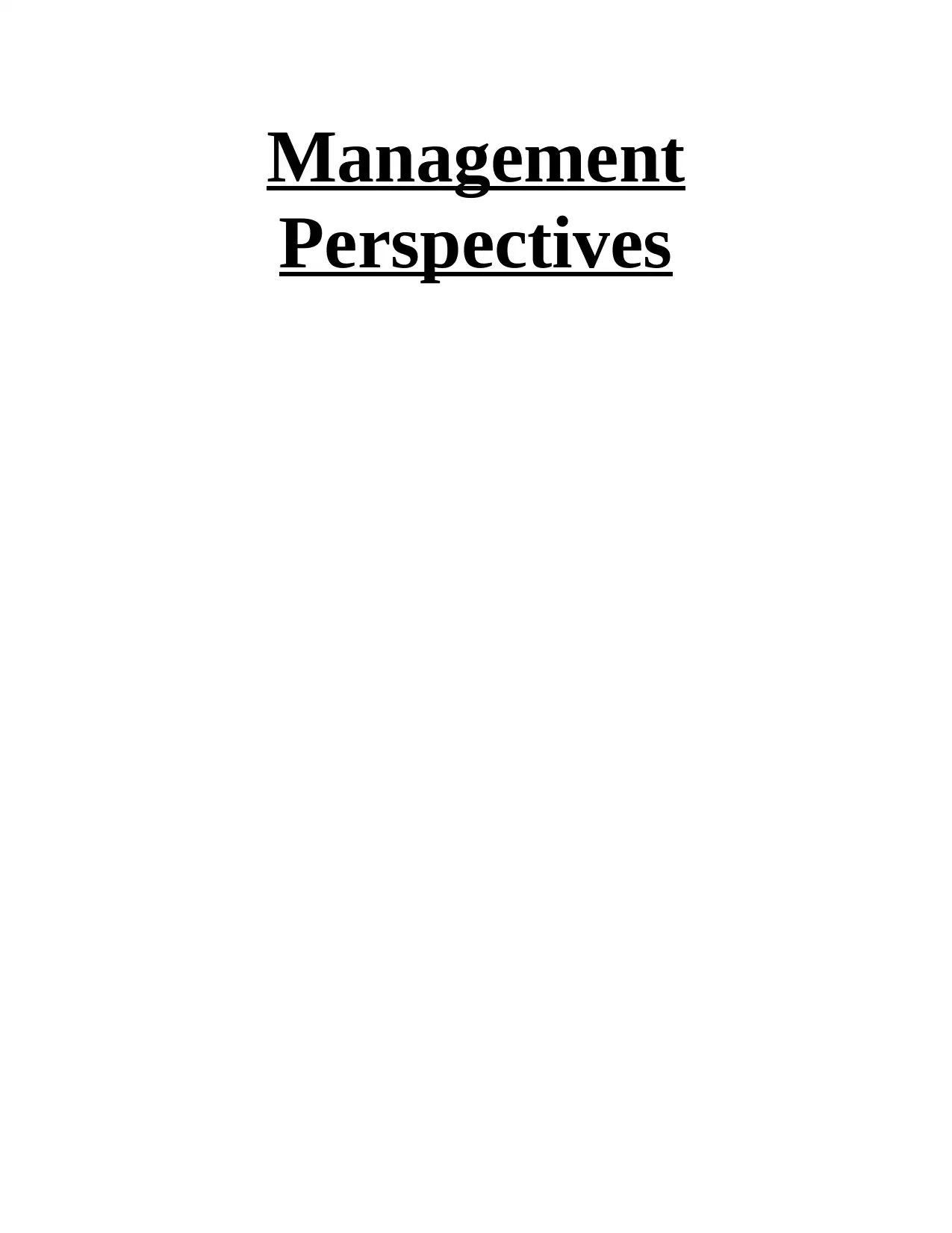
Management
Perspectives
Perspectives
Paraphrase This Document
Need a fresh take? Get an instant paraphrase of this document with our AI Paraphraser
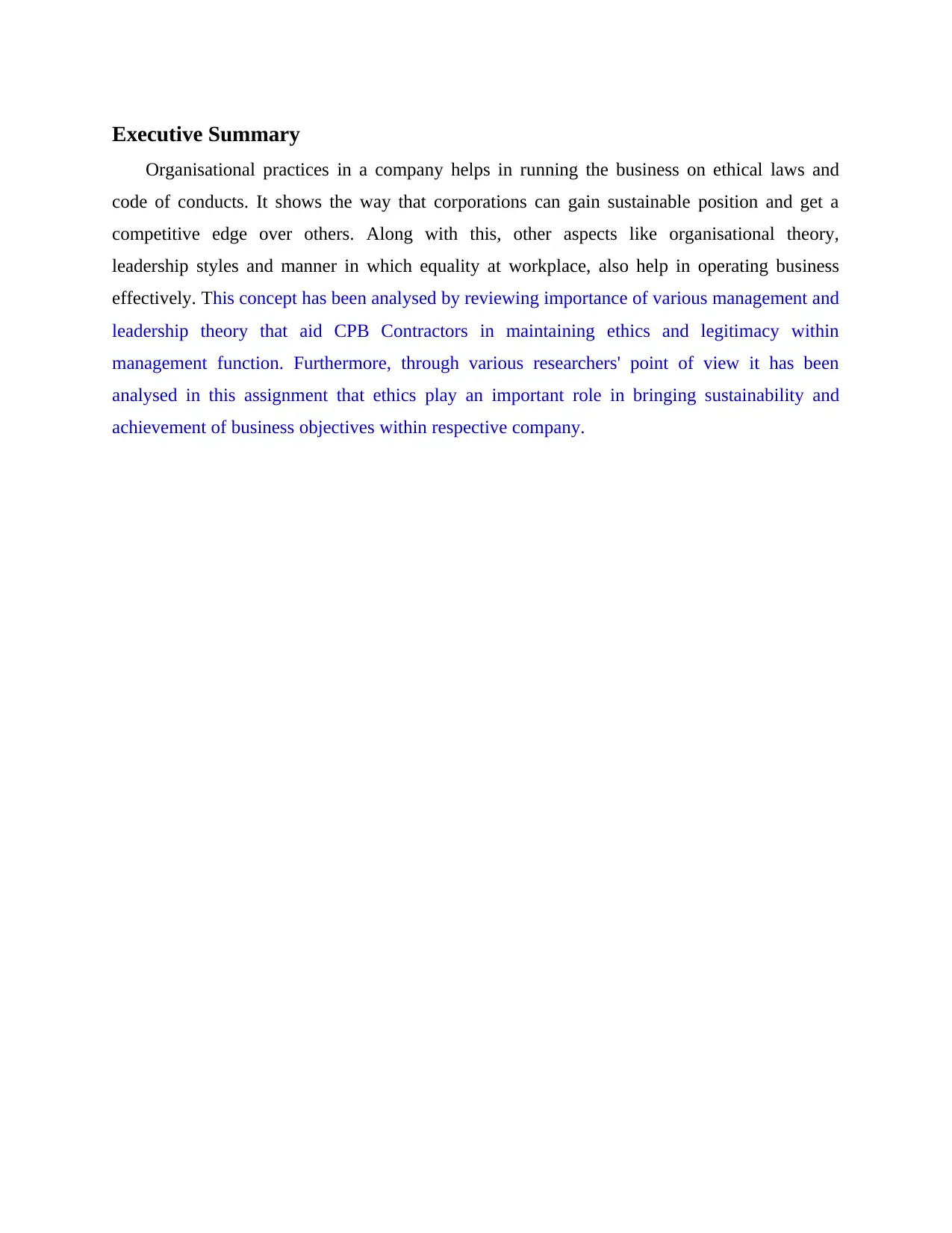
Executive Summary
Organisational practices in a company helps in running the business on ethical laws and
code of conducts. It shows the way that corporations can gain sustainable position and get a
competitive edge over others. Along with this, other aspects like organisational theory,
leadership styles and manner in which equality at workplace, also help in operating business
effectively. This concept has been analysed by reviewing importance of various management and
leadership theory that aid CPB Contractors in maintaining ethics and legitimacy within
management function. Furthermore, through various researchers' point of view it has been
analysed in this assignment that ethics play an important role in bringing sustainability and
achievement of business objectives within respective company.
Organisational practices in a company helps in running the business on ethical laws and
code of conducts. It shows the way that corporations can gain sustainable position and get a
competitive edge over others. Along with this, other aspects like organisational theory,
leadership styles and manner in which equality at workplace, also help in operating business
effectively. This concept has been analysed by reviewing importance of various management and
leadership theory that aid CPB Contractors in maintaining ethics and legitimacy within
management function. Furthermore, through various researchers' point of view it has been
analysed in this assignment that ethics play an important role in bringing sustainability and
achievement of business objectives within respective company.
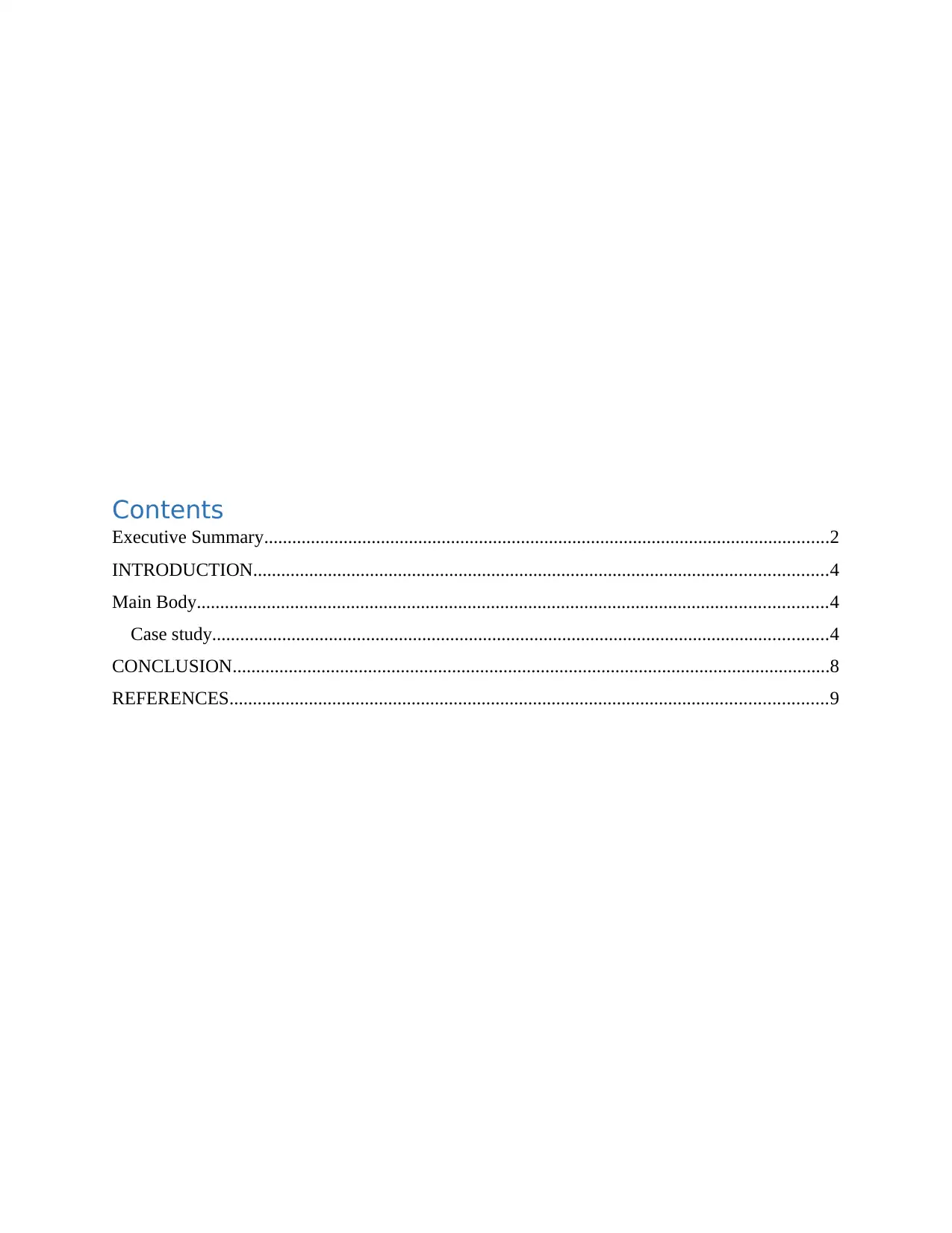
Contents
Executive Summary.........................................................................................................................2
INTRODUCTION...........................................................................................................................4
Main Body.......................................................................................................................................4
Case study....................................................................................................................................4
CONCLUSION................................................................................................................................8
REFERENCES................................................................................................................................9
Executive Summary.........................................................................................................................2
INTRODUCTION...........................................................................................................................4
Main Body.......................................................................................................................................4
Case study....................................................................................................................................4
CONCLUSION................................................................................................................................8
REFERENCES................................................................................................................................9
⊘ This is a preview!⊘
Do you want full access?
Subscribe today to unlock all pages.

Trusted by 1+ million students worldwide
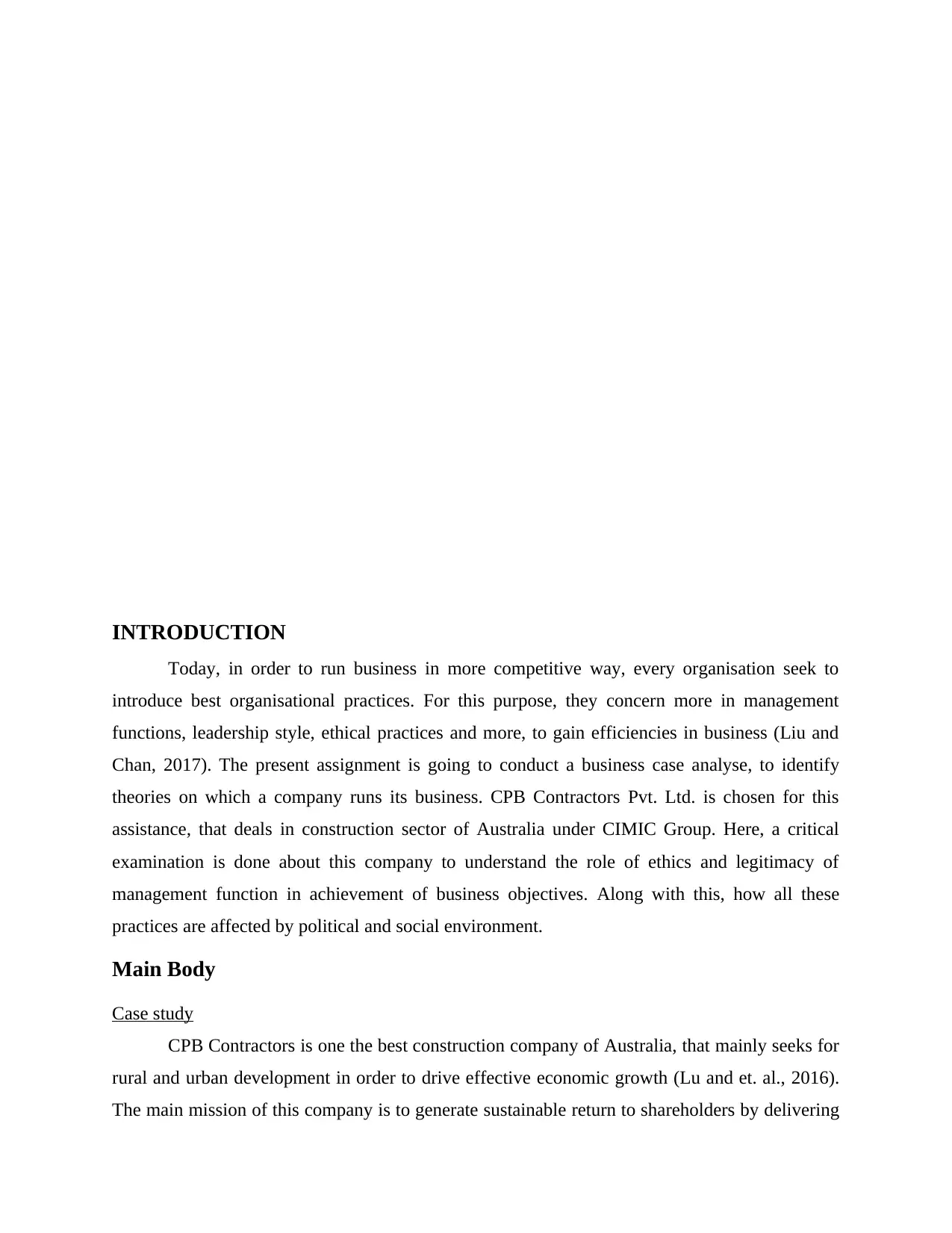
INTRODUCTION
Today, in order to run business in more competitive way, every organisation seek to
introduce best organisational practices. For this purpose, they concern more in management
functions, leadership style, ethical practices and more, to gain efficiencies in business (Liu and
Chan, 2017). The present assignment is going to conduct a business case analyse, to identify
theories on which a company runs its business. CPB Contractors Pvt. Ltd. is chosen for this
assistance, that deals in construction sector of Australia under CIMIC Group. Here, a critical
examination is done about this company to understand the role of ethics and legitimacy of
management function in achievement of business objectives. Along with this, how all these
practices are affected by political and social environment.
Main Body
Case study
CPB Contractors is one the best construction company of Australia, that mainly seeks for
rural and urban development in order to drive effective economic growth (Lu and et. al., 2016).
The main mission of this company is to generate sustainable return to shareholders by delivering
Today, in order to run business in more competitive way, every organisation seek to
introduce best organisational practices. For this purpose, they concern more in management
functions, leadership style, ethical practices and more, to gain efficiencies in business (Liu and
Chan, 2017). The present assignment is going to conduct a business case analyse, to identify
theories on which a company runs its business. CPB Contractors Pvt. Ltd. is chosen for this
assistance, that deals in construction sector of Australia under CIMIC Group. Here, a critical
examination is done about this company to understand the role of ethics and legitimacy of
management function in achievement of business objectives. Along with this, how all these
practices are affected by political and social environment.
Main Body
Case study
CPB Contractors is one the best construction company of Australia, that mainly seeks for
rural and urban development in order to drive effective economic growth (Lu and et. al., 2016).
The main mission of this company is to generate sustainable return to shareholders by delivering
Paraphrase This Document
Need a fresh take? Get an instant paraphrase of this document with our AI Paraphraser
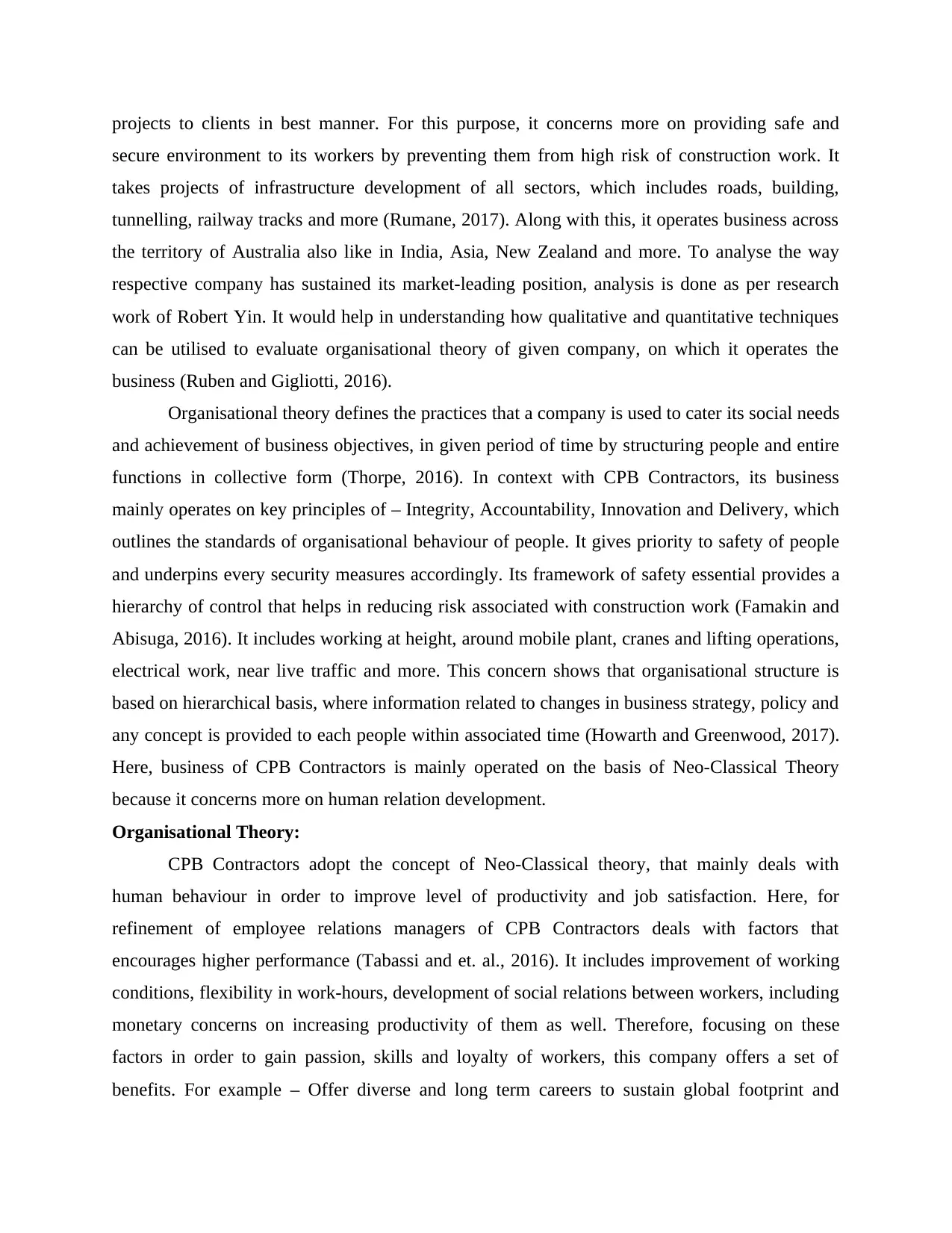
projects to clients in best manner. For this purpose, it concerns more on providing safe and
secure environment to its workers by preventing them from high risk of construction work. It
takes projects of infrastructure development of all sectors, which includes roads, building,
tunnelling, railway tracks and more (Rumane, 2017). Along with this, it operates business across
the territory of Australia also like in India, Asia, New Zealand and more. To analyse the way
respective company has sustained its market-leading position, analysis is done as per research
work of Robert Yin. It would help in understanding how qualitative and quantitative techniques
can be utilised to evaluate organisational theory of given company, on which it operates the
business (Ruben and Gigliotti, 2016).
Organisational theory defines the practices that a company is used to cater its social needs
and achievement of business objectives, in given period of time by structuring people and entire
functions in collective form (Thorpe, 2016). In context with CPB Contractors, its business
mainly operates on key principles of – Integrity, Accountability, Innovation and Delivery, which
outlines the standards of organisational behaviour of people. It gives priority to safety of people
and underpins every security measures accordingly. Its framework of safety essential provides a
hierarchy of control that helps in reducing risk associated with construction work (Famakin and
Abisuga, 2016). It includes working at height, around mobile plant, cranes and lifting operations,
electrical work, near live traffic and more. This concern shows that organisational structure is
based on hierarchical basis, where information related to changes in business strategy, policy and
any concept is provided to each people within associated time (Howarth and Greenwood, 2017).
Here, business of CPB Contractors is mainly operated on the basis of Neo-Classical Theory
because it concerns more on human relation development.
Organisational Theory:
CPB Contractors adopt the concept of Neo-Classical theory, that mainly deals with
human behaviour in order to improve level of productivity and job satisfaction. Here, for
refinement of employee relations managers of CPB Contractors deals with factors that
encourages higher performance (Tabassi and et. al., 2016). It includes improvement of working
conditions, flexibility in work-hours, development of social relations between workers, including
monetary concerns on increasing productivity of them as well. Therefore, focusing on these
factors in order to gain passion, skills and loyalty of workers, this company offers a set of
benefits. For example – Offer diverse and long term careers to sustain global footprint and
secure environment to its workers by preventing them from high risk of construction work. It
takes projects of infrastructure development of all sectors, which includes roads, building,
tunnelling, railway tracks and more (Rumane, 2017). Along with this, it operates business across
the territory of Australia also like in India, Asia, New Zealand and more. To analyse the way
respective company has sustained its market-leading position, analysis is done as per research
work of Robert Yin. It would help in understanding how qualitative and quantitative techniques
can be utilised to evaluate organisational theory of given company, on which it operates the
business (Ruben and Gigliotti, 2016).
Organisational theory defines the practices that a company is used to cater its social needs
and achievement of business objectives, in given period of time by structuring people and entire
functions in collective form (Thorpe, 2016). In context with CPB Contractors, its business
mainly operates on key principles of – Integrity, Accountability, Innovation and Delivery, which
outlines the standards of organisational behaviour of people. It gives priority to safety of people
and underpins every security measures accordingly. Its framework of safety essential provides a
hierarchy of control that helps in reducing risk associated with construction work (Famakin and
Abisuga, 2016). It includes working at height, around mobile plant, cranes and lifting operations,
electrical work, near live traffic and more. This concern shows that organisational structure is
based on hierarchical basis, where information related to changes in business strategy, policy and
any concept is provided to each people within associated time (Howarth and Greenwood, 2017).
Here, business of CPB Contractors is mainly operated on the basis of Neo-Classical Theory
because it concerns more on human relation development.
Organisational Theory:
CPB Contractors adopt the concept of Neo-Classical theory, that mainly deals with
human behaviour in order to improve level of productivity and job satisfaction. Here, for
refinement of employee relations managers of CPB Contractors deals with factors that
encourages higher performance (Tabassi and et. al., 2016). It includes improvement of working
conditions, flexibility in work-hours, development of social relations between workers, including
monetary concerns on increasing productivity of them as well. Therefore, focusing on these
factors in order to gain passion, skills and loyalty of workers, this company offers a set of
benefits. For example – Offer diverse and long term careers to sustain global footprint and
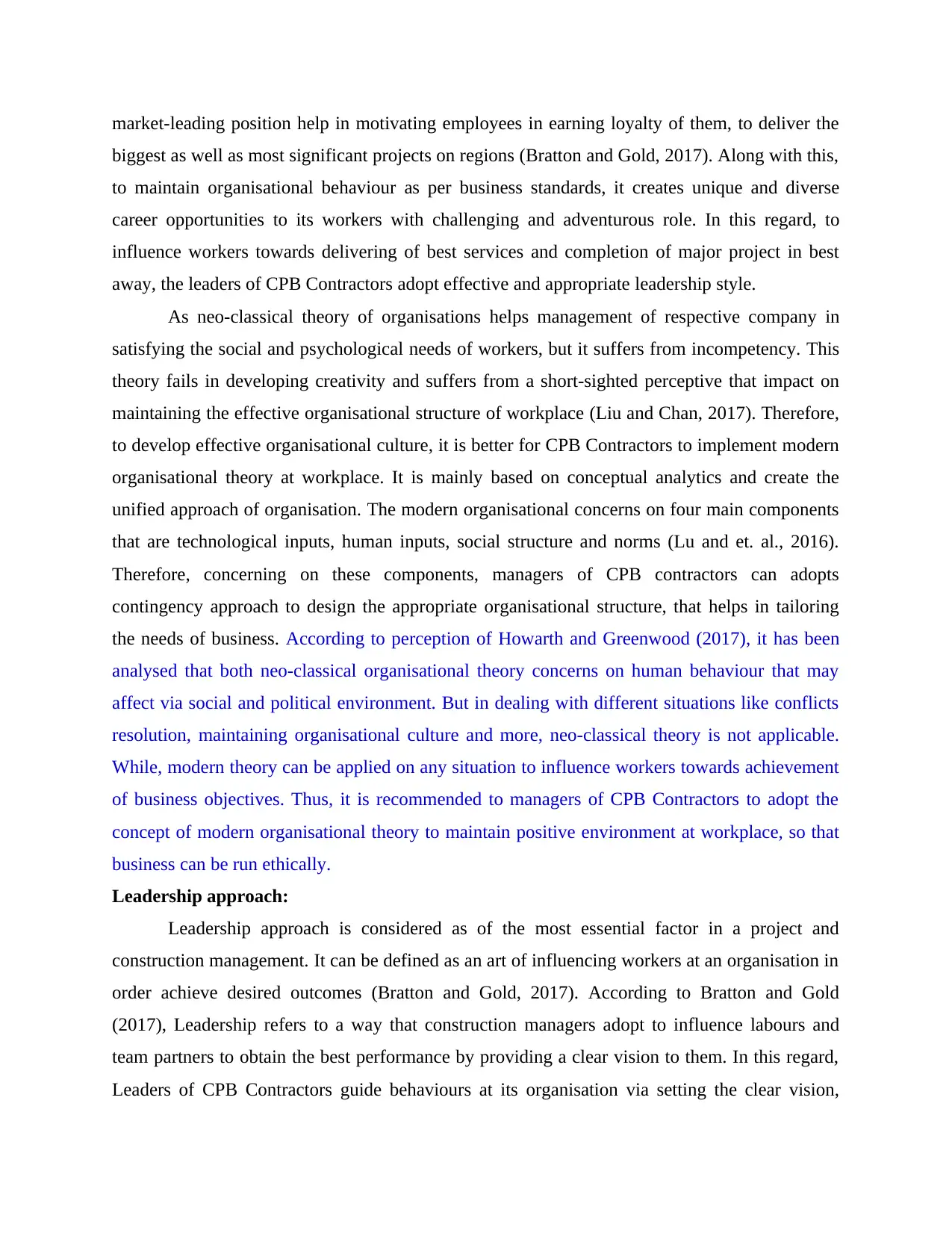
market-leading position help in motivating employees in earning loyalty of them, to deliver the
biggest as well as most significant projects on regions (Bratton and Gold, 2017). Along with this,
to maintain organisational behaviour as per business standards, it creates unique and diverse
career opportunities to its workers with challenging and adventurous role. In this regard, to
influence workers towards delivering of best services and completion of major project in best
away, the leaders of CPB Contractors adopt effective and appropriate leadership style.
As neo-classical theory of organisations helps management of respective company in
satisfying the social and psychological needs of workers, but it suffers from incompetency. This
theory fails in developing creativity and suffers from a short-sighted perceptive that impact on
maintaining the effective organisational structure of workplace (Liu and Chan, 2017). Therefore,
to develop effective organisational culture, it is better for CPB Contractors to implement modern
organisational theory at workplace. It is mainly based on conceptual analytics and create the
unified approach of organisation. The modern organisational concerns on four main components
that are technological inputs, human inputs, social structure and norms (Lu and et. al., 2016).
Therefore, concerning on these components, managers of CPB contractors can adopts
contingency approach to design the appropriate organisational structure, that helps in tailoring
the needs of business. According to perception of Howarth and Greenwood (2017), it has been
analysed that both neo-classical organisational theory concerns on human behaviour that may
affect via social and political environment. But in dealing with different situations like conflicts
resolution, maintaining organisational culture and more, neo-classical theory is not applicable.
While, modern theory can be applied on any situation to influence workers towards achievement
of business objectives. Thus, it is recommended to managers of CPB Contractors to adopt the
concept of modern organisational theory to maintain positive environment at workplace, so that
business can be run ethically.
Leadership approach:
Leadership approach is considered as of the most essential factor in a project and
construction management. It can be defined as an art of influencing workers at an organisation in
order achieve desired outcomes (Bratton and Gold, 2017). According to Bratton and Gold
(2017), Leadership refers to a way that construction managers adopt to influence labours and
team partners to obtain the best performance by providing a clear vision to them. In this regard,
Leaders of CPB Contractors guide behaviours at its organisation via setting the clear vision,
biggest as well as most significant projects on regions (Bratton and Gold, 2017). Along with this,
to maintain organisational behaviour as per business standards, it creates unique and diverse
career opportunities to its workers with challenging and adventurous role. In this regard, to
influence workers towards delivering of best services and completion of major project in best
away, the leaders of CPB Contractors adopt effective and appropriate leadership style.
As neo-classical theory of organisations helps management of respective company in
satisfying the social and psychological needs of workers, but it suffers from incompetency. This
theory fails in developing creativity and suffers from a short-sighted perceptive that impact on
maintaining the effective organisational structure of workplace (Liu and Chan, 2017). Therefore,
to develop effective organisational culture, it is better for CPB Contractors to implement modern
organisational theory at workplace. It is mainly based on conceptual analytics and create the
unified approach of organisation. The modern organisational concerns on four main components
that are technological inputs, human inputs, social structure and norms (Lu and et. al., 2016).
Therefore, concerning on these components, managers of CPB contractors can adopts
contingency approach to design the appropriate organisational structure, that helps in tailoring
the needs of business. According to perception of Howarth and Greenwood (2017), it has been
analysed that both neo-classical organisational theory concerns on human behaviour that may
affect via social and political environment. But in dealing with different situations like conflicts
resolution, maintaining organisational culture and more, neo-classical theory is not applicable.
While, modern theory can be applied on any situation to influence workers towards achievement
of business objectives. Thus, it is recommended to managers of CPB Contractors to adopt the
concept of modern organisational theory to maintain positive environment at workplace, so that
business can be run ethically.
Leadership approach:
Leadership approach is considered as of the most essential factor in a project and
construction management. It can be defined as an art of influencing workers at an organisation in
order achieve desired outcomes (Bratton and Gold, 2017). According to Bratton and Gold
(2017), Leadership refers to a way that construction managers adopt to influence labours and
team partners to obtain the best performance by providing a clear vision to them. In this regard,
Leaders of CPB Contractors guide behaviours at its organisation via setting the clear vision,
⊘ This is a preview!⊘
Do you want full access?
Subscribe today to unlock all pages.

Trusted by 1+ million students worldwide
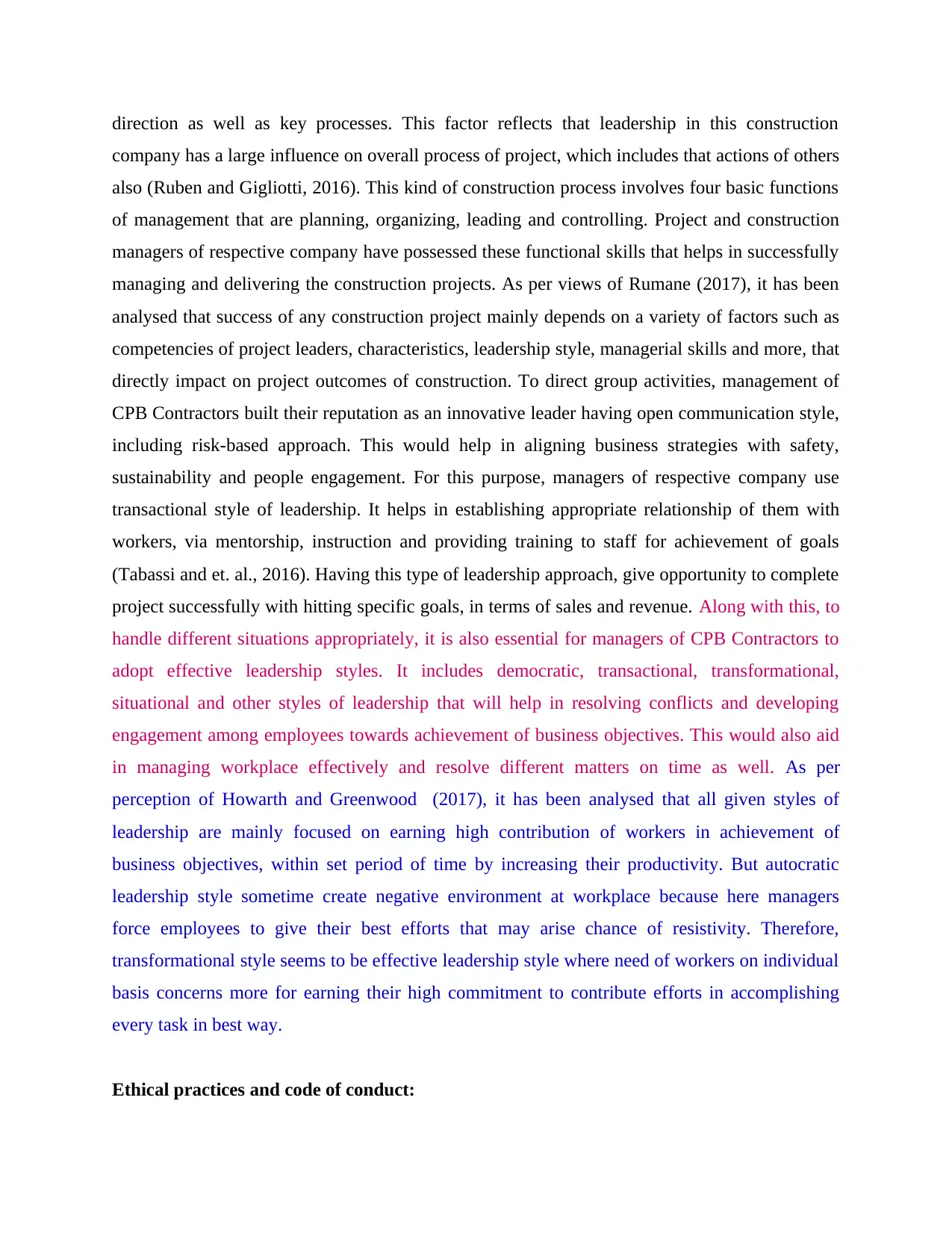
direction as well as key processes. This factor reflects that leadership in this construction
company has a large influence on overall process of project, which includes that actions of others
also (Ruben and Gigliotti, 2016). This kind of construction process involves four basic functions
of management that are planning, organizing, leading and controlling. Project and construction
managers of respective company have possessed these functional skills that helps in successfully
managing and delivering the construction projects. As per views of Rumane (2017), it has been
analysed that success of any construction project mainly depends on a variety of factors such as
competencies of project leaders, characteristics, leadership style, managerial skills and more, that
directly impact on project outcomes of construction. To direct group activities, management of
CPB Contractors built their reputation as an innovative leader having open communication style,
including risk-based approach. This would help in aligning business strategies with safety,
sustainability and people engagement. For this purpose, managers of respective company use
transactional style of leadership. It helps in establishing appropriate relationship of them with
workers, via mentorship, instruction and providing training to staff for achievement of goals
(Tabassi and et. al., 2016). Having this type of leadership approach, give opportunity to complete
project successfully with hitting specific goals, in terms of sales and revenue. Along with this, to
handle different situations appropriately, it is also essential for managers of CPB Contractors to
adopt effective leadership styles. It includes democratic, transactional, transformational,
situational and other styles of leadership that will help in resolving conflicts and developing
engagement among employees towards achievement of business objectives. This would also aid
in managing workplace effectively and resolve different matters on time as well. As per
perception of Howarth and Greenwood (2017), it has been analysed that all given styles of
leadership are mainly focused on earning high contribution of workers in achievement of
business objectives, within set period of time by increasing their productivity. But autocratic
leadership style sometime create negative environment at workplace because here managers
force employees to give their best efforts that may arise chance of resistivity. Therefore,
transformational style seems to be effective leadership style where need of workers on individual
basis concerns more for earning their high commitment to contribute efforts in accomplishing
every task in best way.
Ethical practices and code of conduct:
company has a large influence on overall process of project, which includes that actions of others
also (Ruben and Gigliotti, 2016). This kind of construction process involves four basic functions
of management that are planning, organizing, leading and controlling. Project and construction
managers of respective company have possessed these functional skills that helps in successfully
managing and delivering the construction projects. As per views of Rumane (2017), it has been
analysed that success of any construction project mainly depends on a variety of factors such as
competencies of project leaders, characteristics, leadership style, managerial skills and more, that
directly impact on project outcomes of construction. To direct group activities, management of
CPB Contractors built their reputation as an innovative leader having open communication style,
including risk-based approach. This would help in aligning business strategies with safety,
sustainability and people engagement. For this purpose, managers of respective company use
transactional style of leadership. It helps in establishing appropriate relationship of them with
workers, via mentorship, instruction and providing training to staff for achievement of goals
(Tabassi and et. al., 2016). Having this type of leadership approach, give opportunity to complete
project successfully with hitting specific goals, in terms of sales and revenue. Along with this, to
handle different situations appropriately, it is also essential for managers of CPB Contractors to
adopt effective leadership styles. It includes democratic, transactional, transformational,
situational and other styles of leadership that will help in resolving conflicts and developing
engagement among employees towards achievement of business objectives. This would also aid
in managing workplace effectively and resolve different matters on time as well. As per
perception of Howarth and Greenwood (2017), it has been analysed that all given styles of
leadership are mainly focused on earning high contribution of workers in achievement of
business objectives, within set period of time by increasing their productivity. But autocratic
leadership style sometime create negative environment at workplace because here managers
force employees to give their best efforts that may arise chance of resistivity. Therefore,
transformational style seems to be effective leadership style where need of workers on individual
basis concerns more for earning their high commitment to contribute efforts in accomplishing
every task in best way.
Ethical practices and code of conduct:
Paraphrase This Document
Need a fresh take? Get an instant paraphrase of this document with our AI Paraphraser
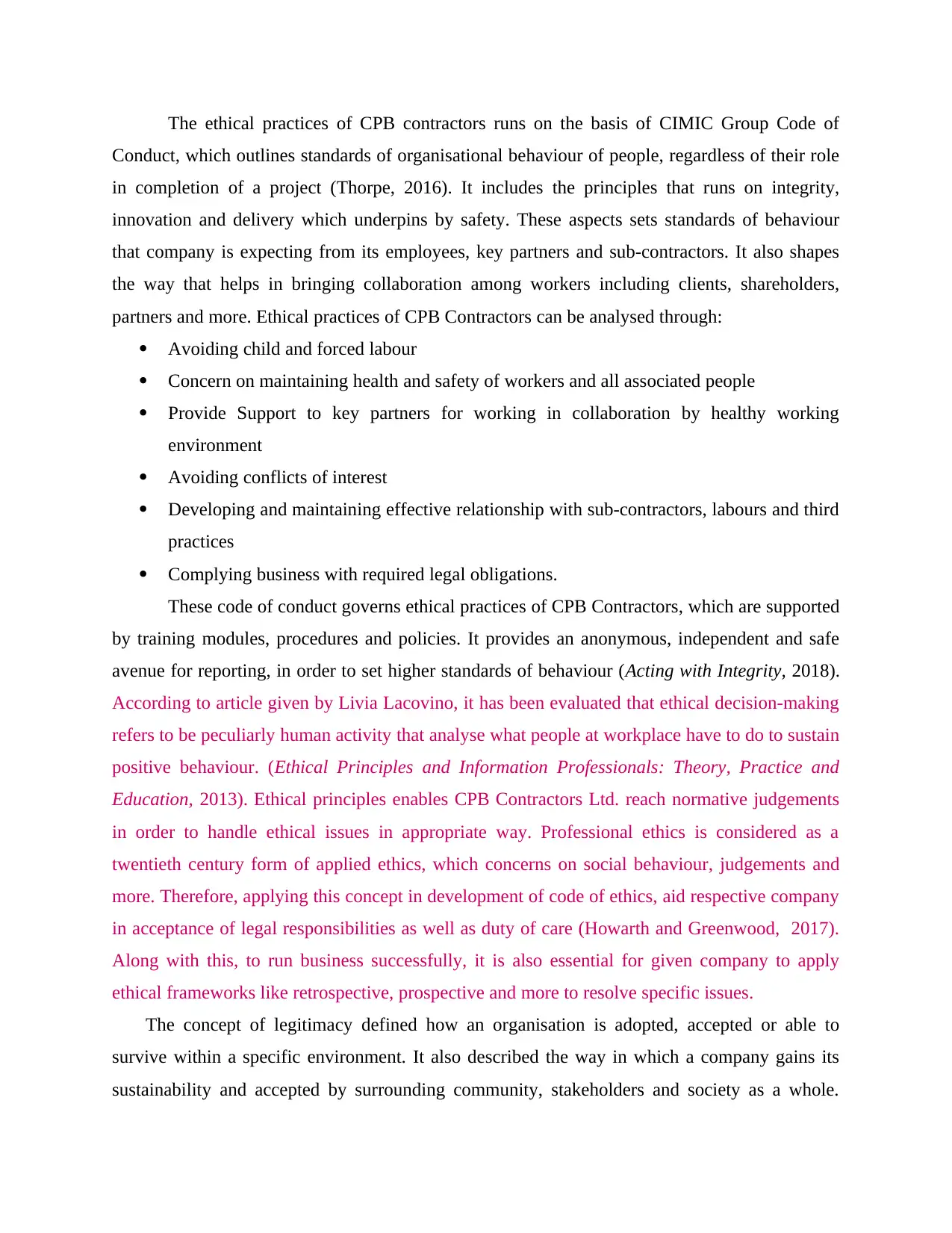
The ethical practices of CPB contractors runs on the basis of CIMIC Group Code of
Conduct, which outlines standards of organisational behaviour of people, regardless of their role
in completion of a project (Thorpe, 2016). It includes the principles that runs on integrity,
innovation and delivery which underpins by safety. These aspects sets standards of behaviour
that company is expecting from its employees, key partners and sub-contractors. It also shapes
the way that helps in bringing collaboration among workers including clients, shareholders,
partners and more. Ethical practices of CPB Contractors can be analysed through:
Avoiding child and forced labour
Concern on maintaining health and safety of workers and all associated people
Provide Support to key partners for working in collaboration by healthy working
environment
Avoiding conflicts of interest
Developing and maintaining effective relationship with sub-contractors, labours and third
practices
Complying business with required legal obligations.
These code of conduct governs ethical practices of CPB Contractors, which are supported
by training modules, procedures and policies. It provides an anonymous, independent and safe
avenue for reporting, in order to set higher standards of behaviour (Acting with Integrity, 2018).
According to article given by Livia Lacovino, it has been evaluated that ethical decision-making
refers to be peculiarly human activity that analyse what people at workplace have to do to sustain
positive behaviour. (Ethical Principles and Information Professionals: Theory, Practice and
Education, 2013). Ethical principles enables CPB Contractors Ltd. reach normative judgements
in order to handle ethical issues in appropriate way. Professional ethics is considered as a
twentieth century form of applied ethics, which concerns on social behaviour, judgements and
more. Therefore, applying this concept in development of code of ethics, aid respective company
in acceptance of legal responsibilities as well as duty of care (Howarth and Greenwood, 2017).
Along with this, to run business successfully, it is also essential for given company to apply
ethical frameworks like retrospective, prospective and more to resolve specific issues.
The concept of legitimacy defined how an organisation is adopted, accepted or able to
survive within a specific environment. It also described the way in which a company gains its
sustainability and accepted by surrounding community, stakeholders and society as a whole.
Conduct, which outlines standards of organisational behaviour of people, regardless of their role
in completion of a project (Thorpe, 2016). It includes the principles that runs on integrity,
innovation and delivery which underpins by safety. These aspects sets standards of behaviour
that company is expecting from its employees, key partners and sub-contractors. It also shapes
the way that helps in bringing collaboration among workers including clients, shareholders,
partners and more. Ethical practices of CPB Contractors can be analysed through:
Avoiding child and forced labour
Concern on maintaining health and safety of workers and all associated people
Provide Support to key partners for working in collaboration by healthy working
environment
Avoiding conflicts of interest
Developing and maintaining effective relationship with sub-contractors, labours and third
practices
Complying business with required legal obligations.
These code of conduct governs ethical practices of CPB Contractors, which are supported
by training modules, procedures and policies. It provides an anonymous, independent and safe
avenue for reporting, in order to set higher standards of behaviour (Acting with Integrity, 2018).
According to article given by Livia Lacovino, it has been evaluated that ethical decision-making
refers to be peculiarly human activity that analyse what people at workplace have to do to sustain
positive behaviour. (Ethical Principles and Information Professionals: Theory, Practice and
Education, 2013). Ethical principles enables CPB Contractors Ltd. reach normative judgements
in order to handle ethical issues in appropriate way. Professional ethics is considered as a
twentieth century form of applied ethics, which concerns on social behaviour, judgements and
more. Therefore, applying this concept in development of code of ethics, aid respective company
in acceptance of legal responsibilities as well as duty of care (Howarth and Greenwood, 2017).
Along with this, to run business successfully, it is also essential for given company to apply
ethical frameworks like retrospective, prospective and more to resolve specific issues.
The concept of legitimacy defined how an organisation is adopted, accepted or able to
survive within a specific environment. It also described the way in which a company gains its
sustainability and accepted by surrounding community, stakeholders and society as a whole.
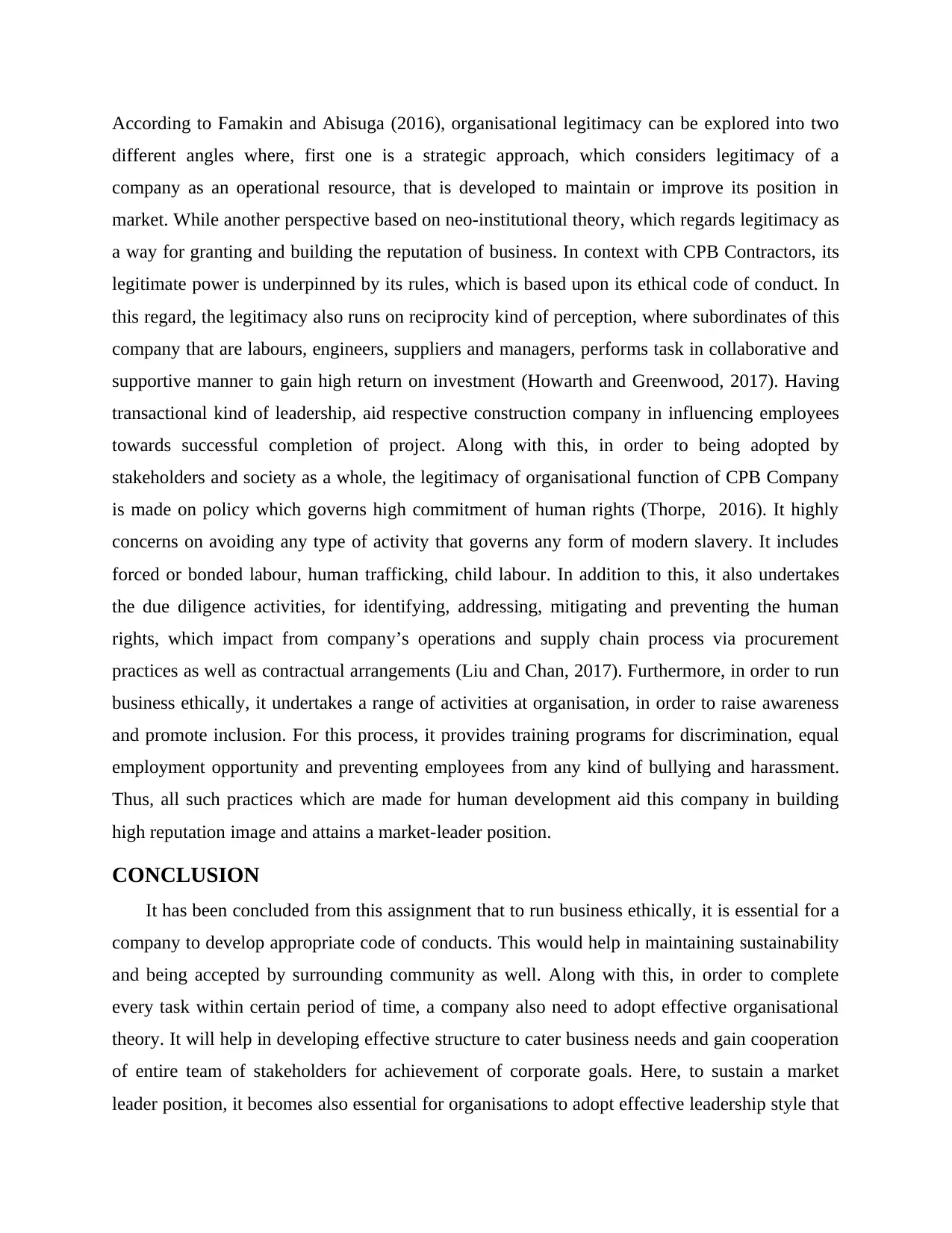
According to Famakin and Abisuga (2016), organisational legitimacy can be explored into two
different angles where, first one is a strategic approach, which considers legitimacy of a
company as an operational resource, that is developed to maintain or improve its position in
market. While another perspective based on neo-institutional theory, which regards legitimacy as
a way for granting and building the reputation of business. In context with CPB Contractors, its
legitimate power is underpinned by its rules, which is based upon its ethical code of conduct. In
this regard, the legitimacy also runs on reciprocity kind of perception, where subordinates of this
company that are labours, engineers, suppliers and managers, performs task in collaborative and
supportive manner to gain high return on investment (Howarth and Greenwood, 2017). Having
transactional kind of leadership, aid respective construction company in influencing employees
towards successful completion of project. Along with this, in order to being adopted by
stakeholders and society as a whole, the legitimacy of organisational function of CPB Company
is made on policy which governs high commitment of human rights (Thorpe, 2016). It highly
concerns on avoiding any type of activity that governs any form of modern slavery. It includes
forced or bonded labour, human trafficking, child labour. In addition to this, it also undertakes
the due diligence activities, for identifying, addressing, mitigating and preventing the human
rights, which impact from company’s operations and supply chain process via procurement
practices as well as contractual arrangements (Liu and Chan, 2017). Furthermore, in order to run
business ethically, it undertakes a range of activities at organisation, in order to raise awareness
and promote inclusion. For this process, it provides training programs for discrimination, equal
employment opportunity and preventing employees from any kind of bullying and harassment.
Thus, all such practices which are made for human development aid this company in building
high reputation image and attains a market-leader position.
CONCLUSION
It has been concluded from this assignment that to run business ethically, it is essential for a
company to develop appropriate code of conducts. This would help in maintaining sustainability
and being accepted by surrounding community as well. Along with this, in order to complete
every task within certain period of time, a company also need to adopt effective organisational
theory. It will help in developing effective structure to cater business needs and gain cooperation
of entire team of stakeholders for achievement of corporate goals. Here, to sustain a market
leader position, it becomes also essential for organisations to adopt effective leadership style that
different angles where, first one is a strategic approach, which considers legitimacy of a
company as an operational resource, that is developed to maintain or improve its position in
market. While another perspective based on neo-institutional theory, which regards legitimacy as
a way for granting and building the reputation of business. In context with CPB Contractors, its
legitimate power is underpinned by its rules, which is based upon its ethical code of conduct. In
this regard, the legitimacy also runs on reciprocity kind of perception, where subordinates of this
company that are labours, engineers, suppliers and managers, performs task in collaborative and
supportive manner to gain high return on investment (Howarth and Greenwood, 2017). Having
transactional kind of leadership, aid respective construction company in influencing employees
towards successful completion of project. Along with this, in order to being adopted by
stakeholders and society as a whole, the legitimacy of organisational function of CPB Company
is made on policy which governs high commitment of human rights (Thorpe, 2016). It highly
concerns on avoiding any type of activity that governs any form of modern slavery. It includes
forced or bonded labour, human trafficking, child labour. In addition to this, it also undertakes
the due diligence activities, for identifying, addressing, mitigating and preventing the human
rights, which impact from company’s operations and supply chain process via procurement
practices as well as contractual arrangements (Liu and Chan, 2017). Furthermore, in order to run
business ethically, it undertakes a range of activities at organisation, in order to raise awareness
and promote inclusion. For this process, it provides training programs for discrimination, equal
employment opportunity and preventing employees from any kind of bullying and harassment.
Thus, all such practices which are made for human development aid this company in building
high reputation image and attains a market-leader position.
CONCLUSION
It has been concluded from this assignment that to run business ethically, it is essential for a
company to develop appropriate code of conducts. This would help in maintaining sustainability
and being accepted by surrounding community as well. Along with this, in order to complete
every task within certain period of time, a company also need to adopt effective organisational
theory. It will help in developing effective structure to cater business needs and gain cooperation
of entire team of stakeholders for achievement of corporate goals. Here, to sustain a market
leader position, it becomes also essential for organisations to adopt effective leadership style that
⊘ This is a preview!⊘
Do you want full access?
Subscribe today to unlock all pages.

Trusted by 1+ million students worldwide

governs that each people follows company’s rules and give contribution in running business
ethically.
ethically.
Paraphrase This Document
Need a fresh take? Get an instant paraphrase of this document with our AI Paraphraser
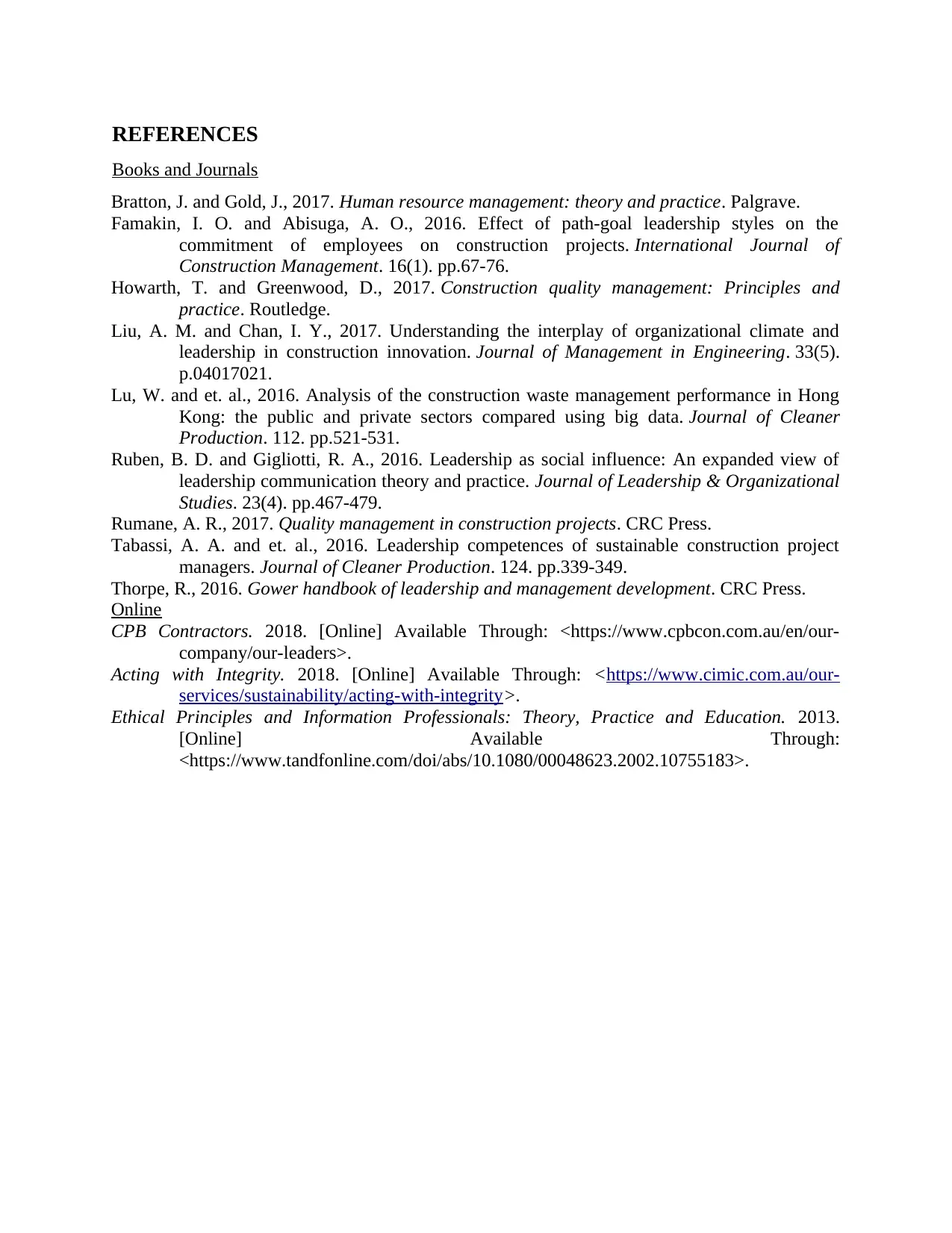
REFERENCES
Books and Journals
Bratton, J. and Gold, J., 2017. Human resource management: theory and practice. Palgrave.
Famakin, I. O. and Abisuga, A. O., 2016. Effect of path-goal leadership styles on the
commitment of employees on construction projects. International Journal of
Construction Management. 16(1). pp.67-76.
Howarth, T. and Greenwood, D., 2017. Construction quality management: Principles and
practice. Routledge.
Liu, A. M. and Chan, I. Y., 2017. Understanding the interplay of organizational climate and
leadership in construction innovation. Journal of Management in Engineering. 33(5).
p.04017021.
Lu, W. and et. al., 2016. Analysis of the construction waste management performance in Hong
Kong: the public and private sectors compared using big data. Journal of Cleaner
Production. 112. pp.521-531.
Ruben, B. D. and Gigliotti, R. A., 2016. Leadership as social influence: An expanded view of
leadership communication theory and practice. Journal of Leadership & Organizational
Studies. 23(4). pp.467-479.
Rumane, A. R., 2017. Quality management in construction projects. CRC Press.
Tabassi, A. A. and et. al., 2016. Leadership competences of sustainable construction project
managers. Journal of Cleaner Production. 124. pp.339-349.
Thorpe, R., 2016. Gower handbook of leadership and management development. CRC Press.
Online
CPB Contractors. 2018. [Online] Available Through: <https://www.cpbcon.com.au/en/our-
company/our-leaders>.
Acting with Integrity. 2018. [Online] Available Through: <https://www.cimic.com.au/our-
services/sustainability/acting-with-integrity>.
Ethical Principles and Information Professionals: Theory, Practice and Education. 2013.
[Online] Available Through:
<https://www.tandfonline.com/doi/abs/10.1080/00048623.2002.10755183>.
Books and Journals
Bratton, J. and Gold, J., 2017. Human resource management: theory and practice. Palgrave.
Famakin, I. O. and Abisuga, A. O., 2016. Effect of path-goal leadership styles on the
commitment of employees on construction projects. International Journal of
Construction Management. 16(1). pp.67-76.
Howarth, T. and Greenwood, D., 2017. Construction quality management: Principles and
practice. Routledge.
Liu, A. M. and Chan, I. Y., 2017. Understanding the interplay of organizational climate and
leadership in construction innovation. Journal of Management in Engineering. 33(5).
p.04017021.
Lu, W. and et. al., 2016. Analysis of the construction waste management performance in Hong
Kong: the public and private sectors compared using big data. Journal of Cleaner
Production. 112. pp.521-531.
Ruben, B. D. and Gigliotti, R. A., 2016. Leadership as social influence: An expanded view of
leadership communication theory and practice. Journal of Leadership & Organizational
Studies. 23(4). pp.467-479.
Rumane, A. R., 2017. Quality management in construction projects. CRC Press.
Tabassi, A. A. and et. al., 2016. Leadership competences of sustainable construction project
managers. Journal of Cleaner Production. 124. pp.339-349.
Thorpe, R., 2016. Gower handbook of leadership and management development. CRC Press.
Online
CPB Contractors. 2018. [Online] Available Through: <https://www.cpbcon.com.au/en/our-
company/our-leaders>.
Acting with Integrity. 2018. [Online] Available Through: <https://www.cimic.com.au/our-
services/sustainability/acting-with-integrity>.
Ethical Principles and Information Professionals: Theory, Practice and Education. 2013.
[Online] Available Through:
<https://www.tandfonline.com/doi/abs/10.1080/00048623.2002.10755183>.
1 out of 11
Related Documents
Your All-in-One AI-Powered Toolkit for Academic Success.
+13062052269
info@desklib.com
Available 24*7 on WhatsApp / Email
![[object Object]](/_next/static/media/star-bottom.7253800d.svg)
Unlock your academic potential
Copyright © 2020–2025 A2Z Services. All Rights Reserved. Developed and managed by ZUCOL.





